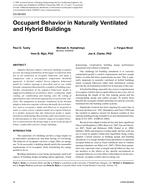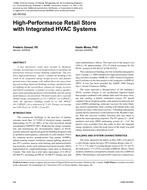Various flueway inserts and their effect on the pressure drop in the flueway and the corresponding total heat transfer to the water side of a gas-fired water heater were studied. A cold-flow setup was designed to measure the pressure drop and to visualize the flow for various inserts. This permitted a comparative evaluation of the performance of different inserts prior to testing in the actual heater.
A submerged combustion chamber water heater was then instnlmented and equipped with selected inserts to determine combustion efficiency, pressure drop, and recovery efficiency. It was expected that the performance of the unit would improve as the pressure drop (resulting from turbulence induced in the flow by the baffle) increased up to the onset of incornplete combustion. Data collected verified the trends anticipated from the cold-flow pressure drop testing. This confirmed that, to some extent, optimum inserts could be selected from cold flow tests.
The recovery efficiency was shown to increase with an increase in the flueway pressure drop up to the onset of incomplete combustion. The evaluation procedure is applicable to forced draft units and atmospheric units of different size, presenting an interesting new perspective to the design and selection of flueway baffle inserts.
Units: Dual
Citation: Symposium, ASHRAE Transactions, 1987, vol. 93, pt. 2, Nashville, TN
Product Details
- Published:
- 1987
- Number of Pages:
- 11
- File Size:
- 1 file , 880 KB
- Product Code(s):
- D-NT-87-11-2


